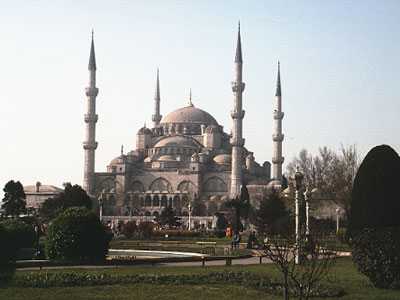Ottoman dreaming
The Turks have new ambitions for trade and influence in Africa
Mar 25th 2010 | KINSHASA AND YAOUNDE | From The Economist print edition
MBOMBO IBRAHIM MOUBARAK, an Islamic cleric who runs Cameroon’s Islamic humanitarian-assistance programme, has a dream. “Turkey must reclaim its mantle as leader of the Islamic world,” he said on March 17th, as Abdullah Gul became the first Turkish president to visit Cameroon and Congo. Mr Moubarak believes that Turkey’s brand of moderate Islam, which embraces Western-style democracy and the free market, offers a model for Africa’s Muslims. He sees nothing sinister about the mosques, madrassas and schools built, restored or run by Sunni Turks across the continent.
Mr Gul’s African expedition was more about finding new markets than new converts, which helps to explain the presence of some 140 Turkish businessmen in his entourage. The economic crisis has hit Turkey’s trade with the rest of Europe. So the “Anatolian tigers”—small-and medium-sized entrepreneurs from Turkey’s conservative heartland—are eyeing opportunities in Africa. And Africans are responding with enthusiasm. In Yaoundé your correspondent was approached in the loo of a five-star hotel by a Cameroonian lady saying “I want to sell timber to Turkey.”
The Turks in turn want to sell Africans a range of finished goods, from washing powder to jeans. Turkish contractors are angling to build airports, housing and dams. Turkish Airlines now has regular flights to Addis Ababa, Dakar, Johannesburg, Lagos and Nairobi. Mehmet Buyukeksi, president of Turkey’s exporters’ association, says that Turkish exports to Africa have leapt from $1.5 billion in 2001 to over $10 billion in 2009. “We believe in the future of Africa,” he declares.
Turkey cannot hope to match up to the likes of China or India. Yet Mr Gul believes it has a competitive edge. “We have come here with a clean slate, with a humanist approach,” he says. In fact Egypt, Libya, Algeria and Sudan were all once part of the Ottoman empire. But farther south Turkey is on virgin turf. Locals often have bitter memories of rapacious Western colonialists and Arab slave traders. This is another reason why Turkish Islam has such appeal—and can be so good for business.
Ebubekir Keskin, a 37-year-old Turkish businessman who settled in Douala, Cameroon, three years ago, swaps Turkish-made pasta for local timber. He says his business model is based on alliances with local Muslims. “Being Muslim helps big time, soon we will overtake the Italians,” he boasts. His ambitions are bolstered by members of Turkey’s largest Islamic fraternity, led by a moderate Muslim cleric, Fetullah Gulen, who lives in America. Gulenists now run 60 schools in 30 African countries. Staffed by locals and Turks alike, the schools are patronised by the offspring of elites lured by Western standards of education (if not mandatory Turkish-language classes).
One day Turkey would like political clout in Africa as well. Its decision to declare 2005 “the year of Africa” was linked to its ambitions for a seat on the UN Security Council. It duly got one, with all but one African country voting in its favour. It has opened or plans 12 new embassies in Africa. Young African diplomats are being trained in Ankara. Scholarships to Turkish universities were doled out during Mr Gul’s latest trip.
Turkey’s desire to join the European Union can sometimes complicate its African ambitions. Faced with EU howls, it had to withdraw a recent invitation to Sudan’s president, Omar al-Bashir, who has been indicted by the International Criminal Court for war crimes in Darfur. Widespread abuses in other African countries that Turkey is wooing could yet cause further headaches.
Mr Gul is undaunted. “There are many people like us here, the Lebanese for example,” he notes. He might have added Armenians and Greeks too. But many of these are descendants of Christians who were killed or deported as the Ottoman empire collapsed, and went on to be big traders in provincial African towns. Unlike their fellow Africans, their feelings for Turkey may not be warm.
